先生のための夏休み経済教室(高校):Summertime Economic Seminar for Teachers (High school) [Report]
「先生のための夏休み経済教室」 in 東京(高校):
”Summertime Economic Seminar for Teachers" in Tokyo (High school)
場所:東京証券取引所・東証ホール:Place: Tokyo Stock Exchange, Tosho Hall
参加者:高校の教員を中心に100名以上:Participants: More than 100 teachers
主催:東京証券取引所グループ、経済教育ネットワーク:TSE Group and NEE (Network for Economic Education)
プログラム:Program
司会・新井明講師(Mr. Arai)と主催者側代表・篠原総一教授(Prof. Shinohara)の挨拶


セッション1:教科書で教える財政の仕組み:Public Finance in Textbooks
10:00-12:00 中川雅之教授(Prof. Nakagawa)の講演


セッション2:教科書で教える市場経済の考え方:Market Economy in Textbooks
13:00-14:30 大竹文雄教授(Prof. Ohtake)の講演


質疑応答と会場の様子:Q & A session with participants


セッション3:教科書で教える金融・証券の仕組み:Finance & Securities in Textboos
14:40-16:10 榊原宏司氏(Mr. Sakakibara)の講演


先生のための「夏休み経済教室」in 東京(高校)要旨:
8月9-10日の中学校教員のための経済教室に引き続き、8月16-17日には高校教員のための経済教室が、東証グループと経済教育ネットワークの主催で、東京の東証ホールで開催された。
1日目(16日)は、司会の新井明講師(小石川中等教育学校・上智大)、および主催者側から東証グループの代表と経済教育ネットワークからは篠原総一教授(同志社大)による挨拶で開会された。
まずセッション1では、中川雅之教授(日大)が「教科書で考える財政の仕組み」というテーマで講演し、財政の経済学の重要な問題を、単に教科書に沿うだけではなく、現実の政府の支出や税収などの問題や数字を使って説明を行った。そのような数字は、財務省のホームページなどウェブ上で容易に見つけることができることも指摘された。特に強調されたのは、政権交代の財政支出への影響、増加し続ける政府債務残高、減少する乗数効果、日本の財政破綻の可能性などの問題であった。
次のセッション2では、大竹文雄教授(大阪大)が「教科書で教える市場経済の考え方」というテーマでプレゼンを行い、まず経済学の見方・考え方として、合理的選択行動が完全競争のもとで効率性をもたらすこと、また効率性の問題と所得分配の問題とを明確に分ける必要があることが指摘された。
次に、よくある疑問として、なぜ供給曲線が右上がりなのか、同じ財なのに店によって価格が違う場合があるのはなぜか、といった問題を取り上げた。さらに、労働市場において、競争的な場合と買手独占的な場合で、最低賃金制が好ましい経済効果を上げるかどうかが議論された。そして最後に、市場の失敗のケースを説明するとともに、政府の失敗も同時に考える必要性が指摘された。
それに続くセッション3では、.榊原宏司氏(東証グループCSR推進部)が、「教科書で教える金融・証券の仕組み」と題する講演を行い、金融および証券市場の仕組みについてミクロとマクロ両面から詳しい説明を行った。
以上が、1日目(16日)のセミナーの要旨であるが、2日目(17日)のスケジュールは以下の通り:
http://www.tse.or.jp/learning/education/kyoin/keizaigaku-t_100816.html
2日目(17日)
9:30-10:00 東証見学(希望者のみ)
10:00-12:00 「教科書で教える国際金融の仕組み」 講師:篠原総一教授(同志社大)
13:00-14:30 「大学入試にでる、教科書には掲載されていない概念・理論の考え方」 講師:野間敏克教授(同志社大)
14:30-16:20 「高校における経済学の授業の進め方」(グループ別ディスカッション) 担当:新井講師、篠原教授、野間教授、加藤教授(日大)
Summertime Economic Seminar for Teachers in Tokyo (High School) Summary:
Following a seminar in economics for middle school teachers on August 9-10, a seminar for high school teachers was held by TSE and NEE at TSE’s Tosho Hall in Tokyo on August 16-17.
On the first day of the seminar, opening remarks were given by Mr. Akira Arai (Lecturer, Koishikawa Middle-High Education School and Sophia Univ.) and a representative of the TSE group as well as Prof. Soichi Shinohara (Doshisha Univ.), representing NEE.
In session 1, Prof. Masayuki Nakagawa (Nihon Univ.) made a detailed presentation on the “Mechanism of Public Finance in Textbook,” in which a number of key points in the economics of public finance were explained not just by following textbooks, but also by taking up current issues and figures in government spending and taxes, available on the web such as the homepage of the Ministry of Finance. Particularly emphasized were the issues of public spending under the new administration, mounting public debt, diminished multiplier effects and a possible budget crisis in Japan.
In session 2, Prof. Fumio Ohtake (Osaka Univ.) gave a talk on the “Market-Economy Approach in Textbooks,” where he explained the economic way of thinking with emphasis on rational choice behavior, leading to efficiency (eliminating waste) under perfect competition, and also on the need for clearly distinguishing between the efficiency issue and the distributional issue. Then often-asked questions were taken up such as why the supply curve is upward-sloping, why actual prices often differ from shop to shop for the same good, etc. Also discussed was the desirability or undesirability of minimum wage legislation under competitive and monopsonistic labor markets. Prof. Ohtake concluded with various cases of market failures, noting that not only market but also government failures should be taken into consideration at the same time.
In session 3, Mr. Koji Sakakibara (TSE group) explained about the “Mechanism of Finance and Securities in Textbooks,” where he took a comprehensive look at financial and securities markets in the context of both micro and macro economics.
The schedule for the second day of the seminar on August 17 can be found on the following page:
http://www.tse.or.jp/learning/education/kyoin/keizaigaku-t_100816.html
Day 2 (August 17)
9:30-10:00 Optional tour in the Tokyo Stock Exchange
10:00-12:00 Session 1: “Mechanism of International Finance in Textbooks” by Prof. Soichi Shinohara (Doshisha Univ.)
13:00-14:30 Session 2: “College Entrance Exam Questions, Not Found in Textbooks” by Prof. Toshikatsu Noma (Doshisha Univ.)
14:30-16:20 Group discussion “How to Teach Economics at High School” by Mr. Arai, Prof. Shinohara, Prof. Noma and Prof. Kato (Nihon Univ.)
”Summertime Economic Seminar for Teachers" in Tokyo (High school)
場所:東京証券取引所・東証ホール:Place: Tokyo Stock Exchange, Tosho Hall
参加者:高校の教員を中心に100名以上:Participants: More than 100 teachers
主催:東京証券取引所グループ、経済教育ネットワーク:TSE Group and NEE (Network for Economic Education)
プログラム:Program
司会・新井明講師(Mr. Arai)と主催者側代表・篠原総一教授(Prof. Shinohara)の挨拶


セッション1:教科書で教える財政の仕組み:Public Finance in Textbooks
10:00-12:00 中川雅之教授(Prof. Nakagawa)の講演


セッション2:教科書で教える市場経済の考え方:Market Economy in Textbooks
13:00-14:30 大竹文雄教授(Prof. Ohtake)の講演


質疑応答と会場の様子:Q & A session with participants


セッション3:教科書で教える金融・証券の仕組み:Finance & Securities in Textboos
14:40-16:10 榊原宏司氏(Mr. Sakakibara)の講演


先生のための「夏休み経済教室」in 東京(高校)要旨:
8月9-10日の中学校教員のための経済教室に引き続き、8月16-17日には高校教員のための経済教室が、東証グループと経済教育ネットワークの主催で、東京の東証ホールで開催された。
1日目(16日)は、司会の新井明講師(小石川中等教育学校・上智大)、および主催者側から東証グループの代表と経済教育ネットワークからは篠原総一教授(同志社大)による挨拶で開会された。
まずセッション1では、中川雅之教授(日大)が「教科書で考える財政の仕組み」というテーマで講演し、財政の経済学の重要な問題を、単に教科書に沿うだけではなく、現実の政府の支出や税収などの問題や数字を使って説明を行った。そのような数字は、財務省のホームページなどウェブ上で容易に見つけることができることも指摘された。特に強調されたのは、政権交代の財政支出への影響、増加し続ける政府債務残高、減少する乗数効果、日本の財政破綻の可能性などの問題であった。
次のセッション2では、大竹文雄教授(大阪大)が「教科書で教える市場経済の考え方」というテーマでプレゼンを行い、まず経済学の見方・考え方として、合理的選択行動が完全競争のもとで効率性をもたらすこと、また効率性の問題と所得分配の問題とを明確に分ける必要があることが指摘された。
次に、よくある疑問として、なぜ供給曲線が右上がりなのか、同じ財なのに店によって価格が違う場合があるのはなぜか、といった問題を取り上げた。さらに、労働市場において、競争的な場合と買手独占的な場合で、最低賃金制が好ましい経済効果を上げるかどうかが議論された。そして最後に、市場の失敗のケースを説明するとともに、政府の失敗も同時に考える必要性が指摘された。
それに続くセッション3では、.榊原宏司氏(東証グループCSR推進部)が、「教科書で教える金融・証券の仕組み」と題する講演を行い、金融および証券市場の仕組みについてミクロとマクロ両面から詳しい説明を行った。
以上が、1日目(16日)のセミナーの要旨であるが、2日目(17日)のスケジュールは以下の通り:
http://www.tse.or.jp/learning/education/kyoin/keizaigaku-t_100816.html
2日目(17日)
9:30-10:00 東証見学(希望者のみ)
10:00-12:00 「教科書で教える国際金融の仕組み」 講師:篠原総一教授(同志社大)
13:00-14:30 「大学入試にでる、教科書には掲載されていない概念・理論の考え方」 講師:野間敏克教授(同志社大)
14:30-16:20 「高校における経済学の授業の進め方」(グループ別ディスカッション) 担当:新井講師、篠原教授、野間教授、加藤教授(日大)
Summertime Economic Seminar for Teachers in Tokyo (High School) Summary:
Following a seminar in economics for middle school teachers on August 9-10, a seminar for high school teachers was held by TSE and NEE at TSE’s Tosho Hall in Tokyo on August 16-17.
On the first day of the seminar, opening remarks were given by Mr. Akira Arai (Lecturer, Koishikawa Middle-High Education School and Sophia Univ.) and a representative of the TSE group as well as Prof. Soichi Shinohara (Doshisha Univ.), representing NEE.
In session 1, Prof. Masayuki Nakagawa (Nihon Univ.) made a detailed presentation on the “Mechanism of Public Finance in Textbook,” in which a number of key points in the economics of public finance were explained not just by following textbooks, but also by taking up current issues and figures in government spending and taxes, available on the web such as the homepage of the Ministry of Finance. Particularly emphasized were the issues of public spending under the new administration, mounting public debt, diminished multiplier effects and a possible budget crisis in Japan.
In session 2, Prof. Fumio Ohtake (Osaka Univ.) gave a talk on the “Market-Economy Approach in Textbooks,” where he explained the economic way of thinking with emphasis on rational choice behavior, leading to efficiency (eliminating waste) under perfect competition, and also on the need for clearly distinguishing between the efficiency issue and the distributional issue. Then often-asked questions were taken up such as why the supply curve is upward-sloping, why actual prices often differ from shop to shop for the same good, etc. Also discussed was the desirability or undesirability of minimum wage legislation under competitive and monopsonistic labor markets. Prof. Ohtake concluded with various cases of market failures, noting that not only market but also government failures should be taken into consideration at the same time.
In session 3, Mr. Koji Sakakibara (TSE group) explained about the “Mechanism of Finance and Securities in Textbooks,” where he took a comprehensive look at financial and securities markets in the context of both micro and macro economics.
The schedule for the second day of the seminar on August 17 can be found on the following page:
http://www.tse.or.jp/learning/education/kyoin/keizaigaku-t_100816.html
Day 2 (August 17)
9:30-10:00 Optional tour in the Tokyo Stock Exchange
10:00-12:00 Session 1: “Mechanism of International Finance in Textbooks” by Prof. Soichi Shinohara (Doshisha Univ.)
13:00-14:30 Session 2: “College Entrance Exam Questions, Not Found in Textbooks” by Prof. Toshikatsu Noma (Doshisha Univ.)
14:30-16:20 Group discussion “How to Teach Economics at High School” by Mr. Arai, Prof. Shinohara, Prof. Noma and Prof. Kato (Nihon Univ.)
先生のための夏休み経済教室(中学)2日目:Summertime Economic Seminar for Teachers (Middle School) Day2 [Report]
「先生のための夏休み経済教室」in 東京(中学校):2日目
"Summertime Economic Seminar for Teachers" @Tokyo (Middle School): Day 2
場所:東京証券取引所・東証ホール; Place: Tokyo Stock Exchange, Tosho Hall
参加者:中学の教員を中心に100名以上; Participants: More than 100 teachers
プログラム: Program:
セッション1:教科書で教える金融の仕組み:Mechanism of Finance in Textbooks
10:00-12:00 司会三枝利多教諭(Mr. Saegusa)と野間敏克教授(Prof. Noma)の講演
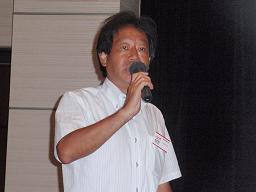
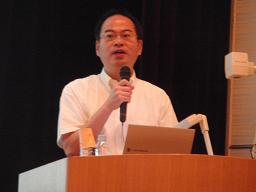
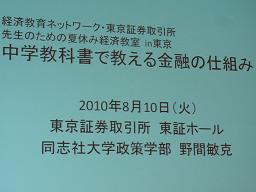
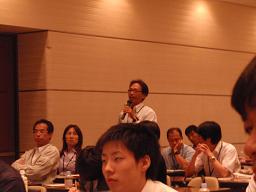
セッション2:企業モデル・シミュレーションの実践:Firm Model-Simulation
13:00-14:40 三枝利多教諭(Mr. Saegusa)による模擬授業と参加者との交流
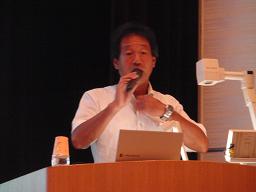
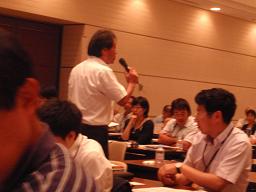
模擬授業に対する栗原久教授(Prof. Kurihara)のコメントとグループ・ディスカッション
14:50-16:30 経済の授業の進め方:How to Teach Economics at Middle School
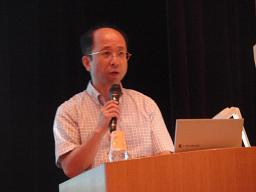
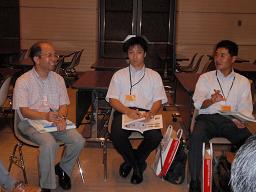
参加者と議論する篠原総一教授(Prof. Shinohara)および加藤一誠教授(Prof. Kato)
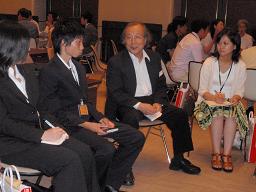
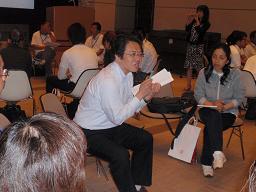
参加者と質疑応答する野間敏克教授(Prof. Noma)および三枝利多教諭(Mr. Saegusa)
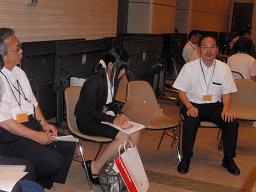
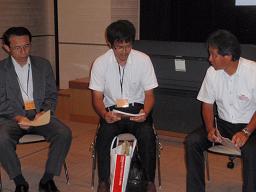
先生のための「夏休み経済教室」(2日目)内容要旨:
8月10日に東証ホールで「中高校教員のための経済教室」の2日目が開催された。
まず総合司会の三枝利多教諭(目黒中央中学)の簡単な開会挨拶の後、野間敏克教授(同志社大)が、「教科書で教える金融の仕組み」についてプレゼンを行った。そこでは、カネの貸し借りが貸し手と借り手の両方の満足度を高めることが強調された。その上で、直接金融と間接金融の説明がなされ、日本では金融のほとんどが間接金融で、直接金融はわずかである事実が指摘された。さらに、金融市場における利子率の決定、また株式市場におけるバブル発生の可能性についての説明があった。そして最後に、日本の貨幣や金融のマクロ的な全体像が示され、金融問題に対処するための金融政策が取り上げられた。
次のセッションでは、三枝教諭が、「企業モデル・シミュレーションの実践」と題する模擬授業を行い、ハウスメーカーの例を取り上げて、企業が他の企業と直接的あるいは間接的に市場で交流するために、会社内にさまざまな仕事や職種が存在することを示した。ここでの基本的なアプローチは、一日目に篠原教授が提示した企業モデルによっているといえる。
その三枝氏のプレゼンに対して、栗原久教授(信州大学)がコメントし、企業もモデル・シミュレーションは学ぶモティベーションを与える上で有益な手段であるが、重要なのは、そのような手段で達成すべき学習目的を明確にすることであると述べた。
以上のプレゼンのセッションの後、グループ・ディスカッションが行われ、篠原総一教授、野間敏克教授、栗原久教授、加藤一誠教授、それに三枝利多教諭を加えた5人が、中学生に経済学をどう教えたらいいかという参加者の質問に答える側に回った。
この2日間の経済教室は、経済学そのものをもっと知りたい、また経済学を教室で生徒たちにより分かりやすく教えたいと望む先生方には、非常に有用な内容であったと思われる。
Summertime Economic Seminar for Teachers (Middle School) – Day 2 Summary:
On the second day of the seminar (8/10), after a brief introduction by Mr. Toshikazu Saegusa (Meguro Chuo Middle School) as the moderator, Prof. Toshikatsu Noma (Doshisha University) gave a talk on the “Mechanism of Finance in Textbooks,” where he first emphasized that money lending and borrowing would generally increase the level of satisfaction for both the lender and the borrower. Then he explained about direct and indirect financing, and pointed out the fact that in Japan indirect financing is dominant, probably too dominant, compared to direct financing. Also discussed were how the interest rate is determined in the financial market and how the bubble can be created in the stock market. Prof. Noma concluded his talk by discussing the macro picture of money and finance as well as monetary policy to deal with financial problems in the economy.
In the next session, Mr. Saegusa made a presentation on the “Practice of the Simulation Model of the Firm,” where a house maker model is used to show various tasks and positions in the firm, interacting with other firms directly or indirectly in the market. The basic approach is based on the firm model presented by Prof. Shinohara on the first day of the seminar.
Then, Prof. Hisashi Kurihara (Shinshu University) commented on Mr. Saegusa’s presentation, saying that his simulation model should be a useful tool to motivate students to learn economics, but the important thing is to clarify teaching objectives to achieve by using such a tool.
After the presentation sessions, group discussions took place, where Professors Soichi Shinohara, Toshikatu Noma, Kazusei Kato and Hisashi Kurihara, joined by Mr. Saegusa, answered participants’ questions as to how to teach economics to middle school students.
The two-day seminar should be useful for middle school teachers who would like to learn about economics itself as well as how to teach economics to their students effectively in classrooms.
"Summertime Economic Seminar for Teachers" @Tokyo (Middle School): Day 2
場所:東京証券取引所・東証ホール; Place: Tokyo Stock Exchange, Tosho Hall
参加者:中学の教員を中心に100名以上; Participants: More than 100 teachers
プログラム: Program:
セッション1:教科書で教える金融の仕組み:Mechanism of Finance in Textbooks
10:00-12:00 司会三枝利多教諭(Mr. Saegusa)と野間敏克教授(Prof. Noma)の講演




セッション2:企業モデル・シミュレーションの実践:Firm Model-Simulation
13:00-14:40 三枝利多教諭(Mr. Saegusa)による模擬授業と参加者との交流


模擬授業に対する栗原久教授(Prof. Kurihara)のコメントとグループ・ディスカッション
14:50-16:30 経済の授業の進め方:How to Teach Economics at Middle School


参加者と議論する篠原総一教授(Prof. Shinohara)および加藤一誠教授(Prof. Kato)


参加者と質疑応答する野間敏克教授(Prof. Noma)および三枝利多教諭(Mr. Saegusa)


先生のための「夏休み経済教室」(2日目)内容要旨:
8月10日に東証ホールで「中高校教員のための経済教室」の2日目が開催された。
まず総合司会の三枝利多教諭(目黒中央中学)の簡単な開会挨拶の後、野間敏克教授(同志社大)が、「教科書で教える金融の仕組み」についてプレゼンを行った。そこでは、カネの貸し借りが貸し手と借り手の両方の満足度を高めることが強調された。その上で、直接金融と間接金融の説明がなされ、日本では金融のほとんどが間接金融で、直接金融はわずかである事実が指摘された。さらに、金融市場における利子率の決定、また株式市場におけるバブル発生の可能性についての説明があった。そして最後に、日本の貨幣や金融のマクロ的な全体像が示され、金融問題に対処するための金融政策が取り上げられた。
次のセッションでは、三枝教諭が、「企業モデル・シミュレーションの実践」と題する模擬授業を行い、ハウスメーカーの例を取り上げて、企業が他の企業と直接的あるいは間接的に市場で交流するために、会社内にさまざまな仕事や職種が存在することを示した。ここでの基本的なアプローチは、一日目に篠原教授が提示した企業モデルによっているといえる。
その三枝氏のプレゼンに対して、栗原久教授(信州大学)がコメントし、企業もモデル・シミュレーションは学ぶモティベーションを与える上で有益な手段であるが、重要なのは、そのような手段で達成すべき学習目的を明確にすることであると述べた。
以上のプレゼンのセッションの後、グループ・ディスカッションが行われ、篠原総一教授、野間敏克教授、栗原久教授、加藤一誠教授、それに三枝利多教諭を加えた5人が、中学生に経済学をどう教えたらいいかという参加者の質問に答える側に回った。
この2日間の経済教室は、経済学そのものをもっと知りたい、また経済学を教室で生徒たちにより分かりやすく教えたいと望む先生方には、非常に有用な内容であったと思われる。
Summertime Economic Seminar for Teachers (Middle School) – Day 2 Summary:
On the second day of the seminar (8/10), after a brief introduction by Mr. Toshikazu Saegusa (Meguro Chuo Middle School) as the moderator, Prof. Toshikatsu Noma (Doshisha University) gave a talk on the “Mechanism of Finance in Textbooks,” where he first emphasized that money lending and borrowing would generally increase the level of satisfaction for both the lender and the borrower. Then he explained about direct and indirect financing, and pointed out the fact that in Japan indirect financing is dominant, probably too dominant, compared to direct financing. Also discussed were how the interest rate is determined in the financial market and how the bubble can be created in the stock market. Prof. Noma concluded his talk by discussing the macro picture of money and finance as well as monetary policy to deal with financial problems in the economy.
In the next session, Mr. Saegusa made a presentation on the “Practice of the Simulation Model of the Firm,” where a house maker model is used to show various tasks and positions in the firm, interacting with other firms directly or indirectly in the market. The basic approach is based on the firm model presented by Prof. Shinohara on the first day of the seminar.
Then, Prof. Hisashi Kurihara (Shinshu University) commented on Mr. Saegusa’s presentation, saying that his simulation model should be a useful tool to motivate students to learn economics, but the important thing is to clarify teaching objectives to achieve by using such a tool.
After the presentation sessions, group discussions took place, where Professors Soichi Shinohara, Toshikatu Noma, Kazusei Kato and Hisashi Kurihara, joined by Mr. Saegusa, answered participants’ questions as to how to teach economics to middle school students.
The two-day seminar should be useful for middle school teachers who would like to learn about economics itself as well as how to teach economics to their students effectively in classrooms.
先生のための夏休み経済教室(中学):Summertime Economic Seminar for Teachers (Middle School) [Report]
「先生のための夏休み経済教室」in 東京(中学校):1日目
"Summertime Economic Seminar for Teachers" @Tokyo (Middle School): Day 1
場所:東京証券取引所・東証ホール; Place: Tokyo Stock Exchange, Tosho Hall
参加者:中学の教員を中心に100名以上; Participants: More than 100 teachers
プログラム: Program:
10:00-10:10 東証の挨拶と司会・三枝利多教諭:Greetings & Moderator (Mr. Saegusa)
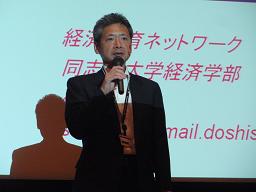
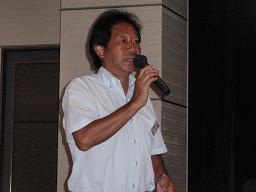
セッション1:教科書で教える経済の仕組み:Economic Mechanism in Textbooks
10:10-12:00 篠原総一教授(Prof. Shinohara)と質疑の様子(Q&A with Participants)
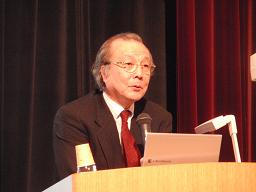
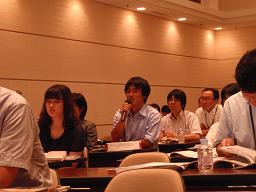
セッション2:経済と経済教育:The Economy and Economic Education
13:00-14:30 吉川洋教授(Prof. Yoshikawa)と会場の様子(Participants)
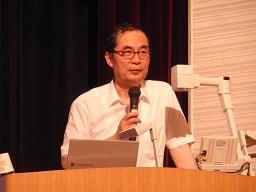
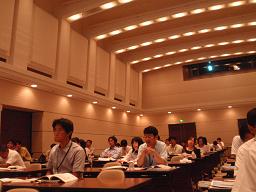
14:40-16:10:証券史料ホール見学・株式模擬売買体験(Securities Archives Hall Tour and Stock Trading Simulation)
16:20-17:20:懇親会・情報交換会(Networking Party)
先生のための「夏休み経済教室」(中学校)-1日目要旨:
中学校教員のための「夏休み経済教室」が、東京証券取引所グループと経済教育ネットワークの協力により、8月9日に東京の東証ホールで開催された。まず1日目は、最初に東証グループの代表と司会の三枝利多教諭(目黒区立目黒中央中学)が開会の挨拶を行った。
セッション1(10:10-12:00)では、篠原総一教授(同志社大)が「教科書で教える経済の仕組み」について講演し、社会の制度や活動の仕組みを理解することが重要であること、またそこで生産における「分業」および市場における「交換」が経済の仕組みの核をなす概念であることを強調した。その上で、「企業モデル」のアウトラインが示され、そのようなモデルで生産、分業、交換などが中学生にとっても容易かつ現実的に理解できることが示された。
次にセッション2(13:00-14:30)では、吉川洋教授(東京大学)が「経済と経済教育」というテーマで講義し、まず経済的な言葉よりも考え方を教える重要性が指摘された。またそれとの関連で、効率性やイノベーションの面では市場経済のほうが社会主義経済よりも勝っていることは確かであるが、所得分配の公正は市場経済ではなかなか実現できない問題として残ることも説明された。さらに、日本の財政問題やグローバル化の遅れなども取り上げられた。
以上の2つのセッションで、参加者から、経済学の成果を教えることの是非、市場経済とグローバル化のマイナス面、および財政問題解決のためのインフレの必要性といったよい(難しい)質問が提起されたが、このことは、参加者が単に中学生に教える以上に進んだ経済学の分析や成果について学びたいという意欲をもっていることを示しているように思われた。
これらの講演のセッションの後、参加者は証券史料ホールの見学と株式模擬売買体験を行い、さらに懇親会に参加し、情報交換などを行った。
参考:
東京での「夏休み経済教室」の2日間のプログラムの詳細は以下を参照:
http://www.tse.or.jp/learning/education/kyoin/keizaigaku-t_100809.html
Summertime Economic Seminar for Teachers (Middle School) - Day 1 Summary:
A summertime seminar in economics for middle school teachers was held by Tokyo Stock Exchange (TSE) in cooperation with the Network for Economic Education at TSE’s Tosho Hall in Tokyo on August 9. The seminar, on the first day, was opened with a welcoming remark by a representative of the TSE group and also by Mr. Toshikazu Saegusa (Megura Chuo Middle School) as the moderator.
In Session 1 (10:10-12:00), Prof. Soichi Shinohara (Doshisha University) gave a talk on "Economic Mechanism in Textbooks" where he emphasized the importance of understanding the economic mechanism of social institutions and activities with “division of labor” in production and “exchange” in the market as the key concepts in the economic mechanism. Then, he outlined a “firm” model, where the mechanism of production, division of labor and exchange can be understood easily and realistically by middle school students.
In Session 2 (13:00-14:30), Prof. Hiroshi Yoshikawa (University of Tokyo) made a presentation on "The Economy and Economic Education," where he maintained that the economic way of thinking, rather than economic terminology, should be taught, and that the market economy would certainly be better than socialism in terms of efficiency and innovation, but equity in income distribution might remain to be an unresolved issue in the market economy. He also talked about the worsening fiscal problem and the delay in economic globalization in Japan.
In both sessions, some participants asked “good” (difficult) questions about scientific results in economics, negative effects of globalization, and the need for inflation to deal with government debt. These questions seemed to indicate that the participants were eager to learn more advanced economic analyses and results than those just for middle school students.
After the lecture sessions, the participants took a tour in TSE’s Securities Archives Hall and joined a stock trading simulation. Finally, they participated in a network party for information exchange.
Reference:
For the 2-day program of the Summertime Economic Seminar (Middle School) in Tokyo, see the following:
http://www.tse.or.jp/learning/education/kyoin/keizaigaku-t_100809.html
"Summertime Economic Seminar for Teachers" @Tokyo (Middle School): Day 1
場所:東京証券取引所・東証ホール; Place: Tokyo Stock Exchange, Tosho Hall
参加者:中学の教員を中心に100名以上; Participants: More than 100 teachers
プログラム: Program:
10:00-10:10 東証の挨拶と司会・三枝利多教諭:Greetings & Moderator (Mr. Saegusa)


セッション1:教科書で教える経済の仕組み:Economic Mechanism in Textbooks
10:10-12:00 篠原総一教授(Prof. Shinohara)と質疑の様子(Q&A with Participants)


セッション2:経済と経済教育:The Economy and Economic Education
13:00-14:30 吉川洋教授(Prof. Yoshikawa)と会場の様子(Participants)


14:40-16:10:証券史料ホール見学・株式模擬売買体験(Securities Archives Hall Tour and Stock Trading Simulation)
16:20-17:20:懇親会・情報交換会(Networking Party)
先生のための「夏休み経済教室」(中学校)-1日目要旨:
中学校教員のための「夏休み経済教室」が、東京証券取引所グループと経済教育ネットワークの協力により、8月9日に東京の東証ホールで開催された。まず1日目は、最初に東証グループの代表と司会の三枝利多教諭(目黒区立目黒中央中学)が開会の挨拶を行った。
セッション1(10:10-12:00)では、篠原総一教授(同志社大)が「教科書で教える経済の仕組み」について講演し、社会の制度や活動の仕組みを理解することが重要であること、またそこで生産における「分業」および市場における「交換」が経済の仕組みの核をなす概念であることを強調した。その上で、「企業モデル」のアウトラインが示され、そのようなモデルで生産、分業、交換などが中学生にとっても容易かつ現実的に理解できることが示された。
次にセッション2(13:00-14:30)では、吉川洋教授(東京大学)が「経済と経済教育」というテーマで講義し、まず経済的な言葉よりも考え方を教える重要性が指摘された。またそれとの関連で、効率性やイノベーションの面では市場経済のほうが社会主義経済よりも勝っていることは確かであるが、所得分配の公正は市場経済ではなかなか実現できない問題として残ることも説明された。さらに、日本の財政問題やグローバル化の遅れなども取り上げられた。
以上の2つのセッションで、参加者から、経済学の成果を教えることの是非、市場経済とグローバル化のマイナス面、および財政問題解決のためのインフレの必要性といったよい(難しい)質問が提起されたが、このことは、参加者が単に中学生に教える以上に進んだ経済学の分析や成果について学びたいという意欲をもっていることを示しているように思われた。
これらの講演のセッションの後、参加者は証券史料ホールの見学と株式模擬売買体験を行い、さらに懇親会に参加し、情報交換などを行った。
参考:
東京での「夏休み経済教室」の2日間のプログラムの詳細は以下を参照:
http://www.tse.or.jp/learning/education/kyoin/keizaigaku-t_100809.html
Summertime Economic Seminar for Teachers (Middle School) - Day 1 Summary:
A summertime seminar in economics for middle school teachers was held by Tokyo Stock Exchange (TSE) in cooperation with the Network for Economic Education at TSE’s Tosho Hall in Tokyo on August 9. The seminar, on the first day, was opened with a welcoming remark by a representative of the TSE group and also by Mr. Toshikazu Saegusa (Megura Chuo Middle School) as the moderator.
In Session 1 (10:10-12:00), Prof. Soichi Shinohara (Doshisha University) gave a talk on "Economic Mechanism in Textbooks" where he emphasized the importance of understanding the economic mechanism of social institutions and activities with “division of labor” in production and “exchange” in the market as the key concepts in the economic mechanism. Then, he outlined a “firm” model, where the mechanism of production, division of labor and exchange can be understood easily and realistically by middle school students.
In Session 2 (13:00-14:30), Prof. Hiroshi Yoshikawa (University of Tokyo) made a presentation on "The Economy and Economic Education," where he maintained that the economic way of thinking, rather than economic terminology, should be taught, and that the market economy would certainly be better than socialism in terms of efficiency and innovation, but equity in income distribution might remain to be an unresolved issue in the market economy. He also talked about the worsening fiscal problem and the delay in economic globalization in Japan.
In both sessions, some participants asked “good” (difficult) questions about scientific results in economics, negative effects of globalization, and the need for inflation to deal with government debt. These questions seemed to indicate that the participants were eager to learn more advanced economic analyses and results than those just for middle school students.
After the lecture sessions, the participants took a tour in TSE’s Securities Archives Hall and joined a stock trading simulation. Finally, they participated in a network party for information exchange.
Reference:
For the 2-day program of the Summertime Economic Seminar (Middle School) in Tokyo, see the following:
http://www.tse.or.jp/learning/education/kyoin/keizaigaku-t_100809.html



